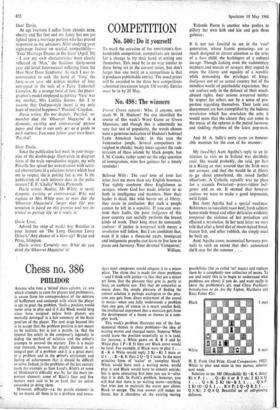COMPETITION
No. 500: Do it yourself
To mark the occasion of the SPECTATOR'S five- hundredth competition, competitors are invited for a change to try their hand at setting one themselves. This need be in no way similar to those being set in the current series, but don't forget that one merit in a competition is that it produces publishable entries. The usual prizes will be awarded to the three best competitions submitted (maximum length 150 words). Entries must be in by 20 May.
No. 498: The winners Trevor Grove reports : Who, if anyone, now reads W. H. Hudson? No one identified the source of this week's Word Game as Green Mansions, and though this is admittedly no very fair test of popularity, the words chosen were a generous indication of Hudson's habitual Latin American locale : in this case the Venezuelan jungle. Several competitors in- veighed in shrieky, beaky tones against the rude invasion of these islands by black people, but J. M. Crooks, rather saner on the edgy question of immigration, wins five guineas for a timely reminder: Beloved Wife: The cool tone of your last letter hurt me more than any English bowman. You rightly condemn these Englishmen as savages, whom God has made inferior to us both in intelligence and manners. Now their leader is dead, like wild beasts set at liberty, they roam in confusion. But such a people cannot be left in a republic. If you can over- look their faults, the poor indigenes of this poor country can usefully perform the lowest kinds of work. Their king must be constantly zealous: if justice is tempered with mercy a revolution will follow. But I am confident that, even if it takes a thousand years, immigrant and indigenous peoples can learn to live here in peace and harmony. Your devoted `Conqueror,' William. Yolande Pierre is another who prefers to pillory her own kith and kin and gets three guineas: - It is not too fanciful to see in the `cool' generation, whose frantic posturings are as much designed to attract attention as the cries of a hurt child, the harbingers of a cultural ice-age. Though lacking even the rudimentary manners and morals of savages, they expect to enjoy the liberty and equality of a republic while demanding the privileges of kings. Indigenes not of an actual country but of the mindless world of psychedelic experience, they are zealous only in the defence of their much- abused rights, their actions tempered neither by respect for others nor by a sense of pro- portion regarding themselves. Their taste and discernment are best exemplified by the hideous revolution which has overtaken the arts; it would seem that the closest they can come to the music of the spheres is the putrid harmony and tinkling rhythms of the latest pop-stars.
And M. A. Sully's entry earns an honour- able mention for the ease of his manner: My (wealthy) Aunt Agatha's reply to an in- vitation to visit us in Ireland was decidedly cool. She would probably, she said, get hurt in a Rising or riot; assured that the Irish were not -savages, and that she would be at liberty to go about unmolested, she raised further objections. A Catholic republic was no place for a staunch Protestant—priest-ridden indi- genes and so on. It seemed that however zealous we were to make a good impression, we'd failed.
But Aunt Agatha had a special weakness. References to succulent roast beef, fresh salmon, home-made bread and other delicacies evidently tempered the violence of her prejudices and effected a revolution. In her next letter we were told that after a hotel diet of steam-baked bread, frozen fish, and other rubbish, she simply must be built up.
Aunt Agatha came; ecumenical harmony pre- vails to such an extent that she's announced she'll stay for the summer . . .






































 Previous page
Previous page